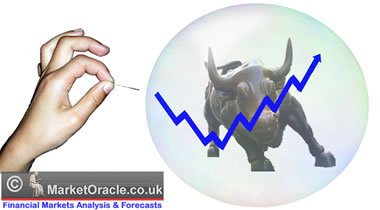What Causes a Financial Bubble?
Stock-Markets / Liquidity Bubble Nov 11, 2020 - 10:20 AM GMTBy: Travis_Bard
Financial bubbles refer to a situation in which an asset sees a rapid increase in price and demand driven by a theoretical interest, then crashes as the rising prices become unsustainable over time. When reaching a specific value, the asset bubble bursts, and its prices reduce to a level that more accurately reflects its intrinsic value. Financial bubbles are typically attributed to a sudden change in investor behaviour, in which hypes, excessive speculation and the strong desire to ‘jump on the bandwagon’ of a certain trending asset play a part. In this article, let’s explore the potential causes of a financial bubble.
For a comprehensive history of financial bubbles, check out this comprehensive timeline by DailyFX.

The Causes of Financial Bubbles
More often than not, bubbles start as the result of seemingly sensible economic motivations. For instance, in the early 2000s, low interest rates and economic prosperity encouraged many individuals in the United States to purchase a house. In the 1990s, web stocks offered some great opportunities for growth for Dot Com businesses. Nonetheless, strongly rising prices and a great degree of optimism in the market can create a situation in which individuals take more risks and asset prices rise more than they reasonably should. A few factors that can cause financial bubbles:
- Monetary policy - Now and again, bubbles happen as an indirect result of financial policies such as low interest rates, which tend to result in excessive spending.
- Herding behaviour. Investors, as all other people, look up to authority and are quick to assume that the majority can’t be wrong. That is why financial bubbles can be triggered when banks and influential leaders in the financial space openly start investing in certain assets.
- Irrational exuberance. When there is a strong but largely unfounded optimism in the market, investors can feel a strong psychological pressure to invest in an asset irrespective of its actual value, as the general assumption is that prices will keep rising. The Tulip Mania of 1637 is a good example of irrational exuberance.
- Cognitive dissonance. When confronted with news that disproves their believes (e.g. that the market is going to grow forever), investors may have a tendency to filter out this bad news and look for reassurance instead.
- Financial instability hypothesis. In a nutshell, periods of economic growth can cause people to be increasingly reckless with their investing decisions.
- Short-termism. People tend to be tempted by short-term gains rather than long-term profitability, which can lead to trends and decisions that aren’t sustainable.
- Expectations based on the recent past. Past performance is no guarantee of future results. Despite of that, investor decisions are often made based on recent developments in the market rather than long-term thinking.
- Hoping to beat the market. Even those who are aware of the potential backlash of financial bubbles may sometimes choose to invest in these unsustainable bull markets hoping they can get out before the market crashes.
- Trade deficits. When a country has a trade deficit, it can start to attract significant money inflows, leading to a high demand for securities, skyrocketing prices and potentially financial bubbles.

This is a short summary of the potential causes of financial bubbles. Once you are aware of their potential causes, it’s easier to avoid losses due to an asset bubble crash.
By Travis Bard
© 2020 Copyright Travis Bard - All Rights Reserved Disclaimer: The above is a matter of opinion provided for general information purposes only and is not intended as investment advice. Information and analysis above are derived from sources and utilising methods believed to be reliable, but we cannot accept responsibility for any losses you may incur as a result of this analysis. Individuals should consult with their personal financial advisors.
© 2005-2022 http://www.MarketOracle.co.uk - The Market Oracle is a FREE Daily Financial Markets Analysis & Forecasting online publication.



